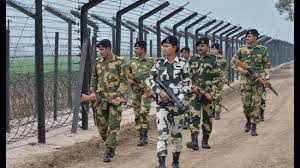Ahmedabad
(Head Office)Address : 506, 3rd EYE THREE (III), Opp. Induben Khakhrawala, Girish Cold Drink Cross Road, CG Road, Navrangpura, Ahmedabad, 380009.
Mobile : 8469231587 / 9586028957
Telephone : 079-40098991
E-mail: dics.upsc@gmail.com

BSF Jurisdiction Expansion
News: The SC is ready to hear the dispute over the expansion of the Border Security Force jurisdiction in Punjab.
Background:
• The Union government passed a notification in October 2021 amending the BSF Act, 1968. It extended the jurisdiction of the BSF from 15 km to 50 km from the International Border in Punjab, West Bengal, and Assam. In Gujarat, the limit was reduced from 80 km to 50 km. While for Rajasthan, it was kept unchanged at 50 km.
• According to the BSF, the decision to extend the jurisdiction of the security force to a 50 km belt along the international border in Punjab, West Bengal, and Assam was taken to ‘give uniformity to the jurisdiction’ across the states.
What is BSF? What are its powers?
• Border Security Force (BSF) was formed in 1968 and stands as India’s first line of defense, securing the nation’s land borders against external threats.
• The BSF’s expanded jurisdiction hands it the authority to execute actions permitted under specific acts, including the CrPC, the Passports Act, and more, across a broader territorial range.
o Search & Arrest: Under the Criminal Procedure Code, the BSF can conduct searches and arrests, foundational in stopping illicit cross-border activities.
o Document Inspection: The Passports Act grants the power to inspect travel documents, crucial in managing and monitoring cross-border travel
o Drug Interdiction: The NDPS Act empowers the BSF to hinder narcotics smuggling, a critical component of transnational crime.
How does extension of BSF jurisdiction help?
• Uniformity in Operations: The amendment brings uniformity for BSF operations in the border states of Punjab, West Bengal, Gujarat, Rajasthan, and Assam, where it can now operate within a 50 km area from the border.
• Effective Border Patrol
• Combat Trans-Border Crimes: The BSF mainly focuses on preventing trans-border crimes, especially unauthorised entry into or exit from Indian territory. The expanded jurisdiction authorises the BSF to conduct more searches and seizures, especially in cases where offenders manage to enter deep into the country’s territory.
• Technological Advancements: The extension is aimed at empowering the BSF to discharge its border guarding duties more effectively in the wake of the use of technology like Dynamic Remotely Operated Navigation Equipment (Drones), Unmanned Aerial Vehicles (UAVs), etc by anti-national forces for surveillance as well as for smuggling of arms, narcotics, and Fake Indian Currency Notes (FICN).
• It facilitates better Cooperation with State Police
What is the stance of Punjab government?
• The government argues that it infringes upon state autonomy in matters of policing and law enforcement, as law and order is a State Subject.
• Disrupting the delicate balance of power between Union and States.
• No prior consultation was taken, challenging cooperative federalism.
• Such a move challenges upon the authority of state policing agencies.
What is Central government’s view?
• It said that the action was aiming to assure national security in the face of evolving threats.
• Advancing drone technologies pose a new category of cross-border threats necessitating a substantial response and increased operational domain for the BSF.
• Smuggling, particularly of cattle, is a prevalent issue transpiring within a deeper belt along the border, requiring BSF intervention.
• Standardizing the BSF jurisdiction across border states is intended to foster a cohesive border security policy.
How will Supreme Court examine the issue?
• The Supreme Court will examine whether the notification issued by the Union government resulting in the increase in the jurisdiction of the BSF in the State of Punjab constitutes an arbitrary exercise of power of the BSF Act 1968.
• The court will also examine whether the increase of the jurisdiction of the BSF is beyond the local limits of areas adjoining the borders of India.
• The court will also examine whether all states have to be treated alike for the purpose of determining the local limits of areas adjoining the borders of India under Section 139 (1) of the BSF Act, 1968.
• The court will also examine whether the constitutionality of the notification of October 11, 2021 can be challenged in an original suit under Article 131 of the Constitution.

Address : 506, 3rd EYE THREE (III), Opp. Induben Khakhrawala, Girish Cold Drink Cross Road, CG Road, Navrangpura, Ahmedabad, 380009.
Mobile : 8469231587 / 9586028957
Telephone : 079-40098991
E-mail: dics.upsc@gmail.com
Address: A-306, The Landmark, Urjanagar-1, Opp. Spicy Street, Kudasan – Por Road, Kudasan, Gandhinagar – 382421
Mobile : 9723832444 / 9723932444
E-mail: dics.gnagar@gmail.com
Address: 2nd Floor, 9 Shivali Society, L&T Circle, opp. Ratri Bazar, Karelibaugh, Vadodara, 390018
Mobile : 9725692037 / 9725692054
E-mail: dics.vadodara@gmail.com
Address: 403, Raj Victoria, Opp. Pal Walkway, Near Galaxy Circle, Pal, Surat-394510
Mobile : 8401031583 / 8401031587
E-mail: dics.surat@gmail.com
Address: 303,305 K 158 Complex Above Magson, Sindhubhavan Road Ahmedabad-380059
Mobile : 9974751177 / 8469231587
E-mail: dicssbr@gmail.com
Address: 57/17, 2nd Floor, Old Rajinder Nagar Market, Bada Bazaar Marg, Delhi-60
Mobile : 9104830862 / 9104830865
E-mail: dics.newdelhi@gmail.com